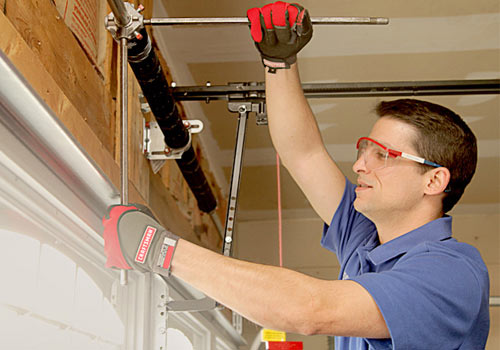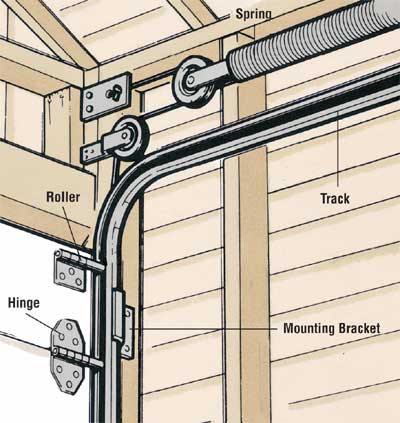Common Garage Door Problems and Just How to Deal with Them
Garage doors are necessary for both safety and benefit, yet they typically offer a selection of common issues that can annoy house owners. While some concerns might show up straightforward to resolve, others may need a more nuanced understanding of garage door technicians.
Noisy Garage Door Operation
A loud garage door operation can be a substantial source of nuisance for homeowners, commonly suggesting underlying mechanical problems. Such disruptions might come from numerous reasons, including worn-out rollers, loosened hardware, or insufficient lubrication. Determining the resource of the sound is crucial for reliable resolution.
One typical root cause of excessive noise is the presence of rustic or damaged rollers. Over time, these elements can deteriorate, resulting in grinding or squeaking sounds as the door actions. Routine inspection and replacement of these rollers can considerably decrease sound degrees. Additionally, loosened screws or screws in the door mechanism can produce rattling audios during procedure. Tightening these fasteners ensures an extra stable and quieter movement.
One more adding element is poor lubrication of the door's moving parts. Applying a top notch lubricant to the tracks, springs, and rollers can significantly lessen friction and noise. Homeowners must execute this upkeep periodically to preserve optimal efficiency.
Lastly, the garage door opener might likewise create noise as a result of its age or mechanical issues. If the noise continues in spite of addressing various other elements, seeking advice from a specialist for a thorough assessment and prospective fixing may be needed.
Door Won't Open Up or Close
Experiencing a garage door that won't open or close can be exceptionally discouraging and typically signals a breakdown within the system. Several variables can contribute to this concern, and identifying the source is essential for reliable resolution.

Following, examine the safety and security sensors situated at the base of the door. These sensors can become misaligned or blocked by debris, stopping the door from running correctly. Tidy the sensing units with a soft cloth and guarantee they are lined up.
Additionally, the garage door's inner components need to be reviewed. Concerns such as a broken springtime, damaged rollers, or a harmed opener can impede activity. If any elements appear to be harmed, it might be recommended to seek advice from an expert for repairs.
Misaligned Tracks
(Proven Results)Misaligned tracks can seriously interfere with the smooth operation of a garage door, causing functional failures such as uneven motion or total immobilization. This issue normally arises because of a range of aspects, consisting of wear and tear, unintentional effects, or improper setup. When the tracks are misaligned, the rollers can not move easily, which not only strains the electric motor yet likewise postures safety and security threats.
If you observe any disparities, it is vital to deal with the concern quickly. Carefully touch the track back into its right position making use of a rubber mallet or a comparable device, ensuring it is straight and degree.
Once the placement is dealt with, retighten the screws to protect the track. For an extra long-term remedy, consider reinforcing the tracks with extra braces. Regular maintenance, consisting of cleaning up the tracks and guaranteeing rollers remain in good problem, can protect against future misalignments. By attending to misaligned tracks promptly, you can restore the performance of your garage door and boost its longevity.
Broken Springs
Amongst the numerous components of a garage door system, broken springtimes are just one of one of the most common issues that can substantially restrain its functionality. Garage door springs are essential for balancing the weight of the door, enabling for smooth opening and closing. When a spring breaks, it can cause a door that is tough to run or, sometimes, entirely unusable.
There are 2 major kinds of springs: torsion springs, which are installed above the door, and expansion springs, located on either side. Signs of a damaged spring consist of a door that won't open up, a visible gap in the springtime, or a loud noise throughout operation. Trying to run a garage door with a damaged spring can create more damage to the door or the opener.
Repairing broken springtimes is not go to my blog a do it yourself project; it requires specialized tools and know-how because of the high stress entailed. It is a good idea to get in touch with a professional service technician who can safely replace the springtimes and make sure the door is properly balanced. Routine upkeep and examinations can help protect against spring failings and prolong the lifespan of the garage door system.
Remote Control Issues

If the remote still falls short to operate, examine the garage door opener to guarantee that its sensors are tidy and unhampered. Dirt, debris, or misalignment might impede the signal transmission between the remote and the opener.
Disturbance from other electronic tools can additionally hamper remote performance. Guarantee that nearby tools, such as wireless routers or cordless phones, are not causing disturbances. garage door service. If disturbance is thought, try relocating these gadgets further far from the garage door opener
In many cases, the remote may require to be reprogrammed. Get in touch with the supplier's guidelines to reset the push-button control and synchronize it with the garage door opener. If all else stops working and the remote remains to malfunction, take into consideration getting in touch with a specialist technician for a thorough evaluation and prospective replacement of the remote or opener.
Final Thought
(Award-Winning Service)In summary, common garage door issues can substantially affect functionality and security. Dealing with loud operation includes lubrication and tightening up hardware, while issues with opening or closing need examination of source of power and sensors. Misaligned tracks can be treated via adjustment, although damaged springs require specialist treatment. Remote breakdowns generally develop from weak batteries or disturbance, which can be settled via replacement or reprogramming. Positive upkeep and prompt fixings can make certain optimum efficiency and long life of garage doors.